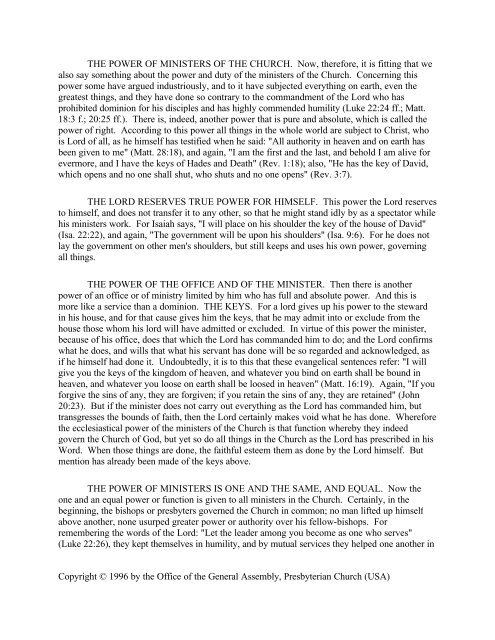The Book of Confessions - The Presbyterian Leader
The Book of Confessions - The Presbyterian Leader
The Book of Confessions - The Presbyterian Leader
You also want an ePaper? Increase the reach of your titles
YUMPU automatically turns print PDFs into web optimized ePapers that Google loves.
THE POWER OF MINISTERS OF THE CHURCH. Now, therefore, it is fitting that we<br />
also say something about the power and duty <strong>of</strong> the ministers <strong>of</strong> the Church. Concerning this<br />
power some have argued industriously, and to it have subjected everything on earth, even the<br />
greatest things, and they have done so contrary to the commandment <strong>of</strong> the Lord who has<br />
prohibited dominion for his disciples and has highly commended humility (Luke 22:24 ff.; Matt.<br />
18:3 f.; 20:25 ff.). <strong>The</strong>re is, indeed, another power that is pure and absolute, which is called the<br />
power <strong>of</strong> right. According to this power all things in the whole world are subject to Christ, who<br />
is Lord <strong>of</strong> all, as he himself has testified when he said: "All authority in heaven and on earth has<br />
been given to me" (Matt. 28:18), and again, "I am the first and the last, and behold I am alive for<br />
evermore, and I have the keys <strong>of</strong> Hades and Death" (Rev. 1:18); also, "He has the key <strong>of</strong> David,<br />
which opens and no one shall shut, who shuts and no one opens" (Rev. 3:7).<br />
THE LORD RESERVES TRUE POWER FOR HIMSELF. This power the Lord reserves<br />
to himself, and does not transfer it to any other, so that he might stand idly by as a spectator while<br />
his ministers work. For Isaiah says, "I will place on his shoulder the key <strong>of</strong> the house <strong>of</strong> David"<br />
(Isa. 22:22), and again, "<strong>The</strong> government will be upon his shoulders" (Isa. 9:6). For he does not<br />
lay the government on other men's shoulders, but still keeps and uses his own power, governing<br />
all things.<br />
THE POWER OF THE OFFICE AND OF THE MINISTER. <strong>The</strong>n there is another<br />
power <strong>of</strong> an <strong>of</strong>fice or <strong>of</strong> ministry limited by him who has full and absolute power. And this is<br />
more like a service than a dominion. THE KEYS. For a lord gives up his power to the steward<br />
in his house, and for that cause gives him the keys, that he may admit into or exclude from the<br />
house those whom his lord will have admitted or excluded. In virtue <strong>of</strong> this power the minister,<br />
because <strong>of</strong> his <strong>of</strong>fice, does that which the Lord has commanded him to do; and the Lord confirms<br />
what he does, and wills that what his servant has done will be so regarded and acknowledged, as<br />
if he himself had done it. Undoubtedly, it is to this that these evangelical sentences refer: "I will<br />
give you the keys <strong>of</strong> the kingdom <strong>of</strong> heaven, and whatever you bind on earth shall be bound in<br />
heaven, and whatever you loose on earth shall be loosed in heaven" (Matt. 16:19). Again, "If you<br />
forgive the sins <strong>of</strong> any, they are forgiven; if you retain the sins <strong>of</strong> any, they are retained" (John<br />
20:23). But if the minister does not carry out everything as the Lord has commanded him, but<br />
transgresses the bounds <strong>of</strong> faith, then the Lord certainly makes void what he has done. Wherefore<br />
the ecclesiastical power <strong>of</strong> the ministers <strong>of</strong> the Church is that function whereby they indeed<br />
govern the Church <strong>of</strong> God, but yet so do all things in the Church as the Lord has prescribed in his<br />
Word. When those things are done, the faithful esteem them as done by the Lord himself. But<br />
mention has already been made <strong>of</strong> the keys above.<br />
THE POWER OF MINISTERS IS ONE AND THE SAME, AND EQUAL. Now the<br />
one and an equal power or function is given to all ministers in the Church. Certainly, in the<br />
beginning, the bishops or presbyters governed the Church in common; no man lifted up himself<br />
above another, none usurped greater power or authority over his fellow-bishops. For<br />
remembering the words <strong>of</strong> the Lord: "Let the leader among you become as one who serves"<br />
(Luke 22:26), they kept themselves in humility, and by mutual services they helped one another in<br />
Copyright © 1996 by the Office <strong>of</strong> the General Assembly, <strong>Presbyterian</strong> Church (USA)




